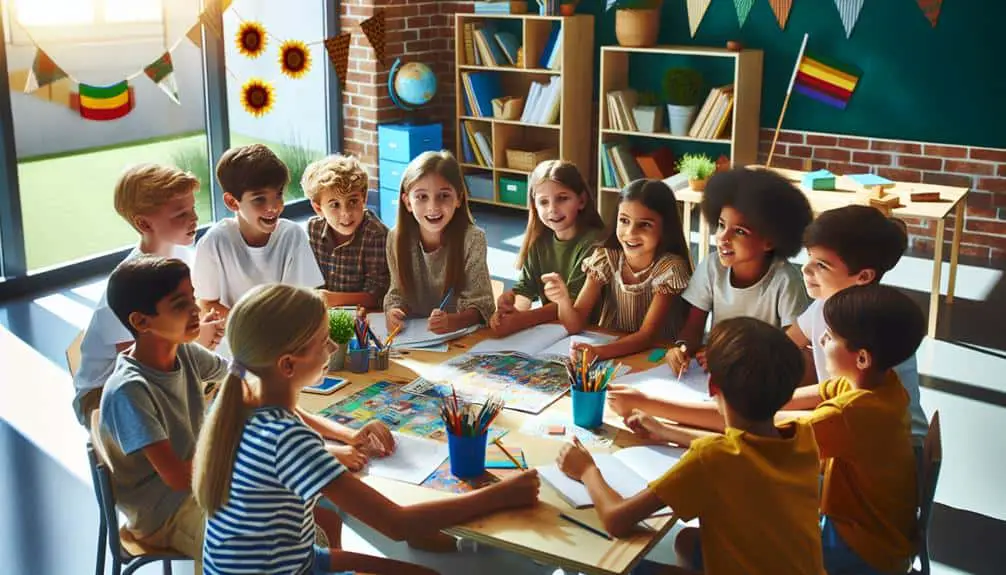Socialization in homeschooling is essential for holistic development. It builds important social skills and expands perspectives, enhancing emotional intelligence. Academic growth is bolstered through tailored learning experiences that cater to individual strengths. Flexibility in teaching methods nurtures cognitive abilities. Effective social interaction strategies, like group activities, are key. Participation in community projects fosters diverse perspectives and prepares for future endeavors. Overcome challenges by seeking structured social opportunities, engaging in extracurriculars, and balancing online and offline interactions. Socialization offers unique benefits that complement academic growth and overall development, ensuring a well-rounded educational experience.
Key Points
- Socialization fosters emotional intelligence and empathy, crucial for academic success.
- Exposure to diverse perspectives through social interactions enhances cognitive growth.
- Group activities promote essential social skills development in homeschool academics.
- Community involvement activities prepare students for future academic and professional endeavors.
- Balancing socialization opportunities nurtures well-rounded homeschool academics.
Socialization Concerns in Homeschooling
In homeschooling, the concern over socialization often arises due to the limited exposure to peer interactions outside of traditional school settings. Socialization challenges can include a lack of daily interaction with peers, fewer opportunities for group activities, and limited exposure to diverse perspectives. These challenges may lead to worries about a child's ability to develop important social skills, such as communication, cooperation, and conflict resolution.
However, it's essential to recognize that homeschooling also offers unique socialization benefits. By having more control over their social environment, homeschoolers can foster deeper connections with family members, engage in meaningful discussions with people of various ages, and participate in community activities that align with their interests. This tailored approach to socialization can result in enhanced emotional intelligence, stronger interpersonal relationships, and a greater sense of belonging.
Impact on Academic Development
Enhancing academic development through homeschooling involves integrating tailored learning experiences that cater to individual strengths and interests. This personalized approach fosters cognitive growth by allowing students to explore further into subjects they're passionate about and excel in. Homeschooling also provides the flexibility to adapt teaching methods to suit the unique learning styles of each child, further enhancing their cognitive abilities.
Moreover, homeschooling nurtures emotional intelligence by creating a supportive environment where students can freely express their thoughts and emotions. This emotional awareness and understanding of self and others are essential skills that contribute to academic success. By encouraging open communication and empathy, homeschooling helps children develop strong interpersonal skills that are beneficial for their academic pursuits and future careers.
Strategies for Social Interaction
To optimize the academic benefits of homeschooling, implementing effective strategies for social interaction is crucial in fostering well-rounded development in students. Group activities play an essential role in providing homeschoolers with opportunities to interact with peers and develop essential social skills. Organizing regular group activities such as field trips, study sessions, or sports events can enhance peer relationships and create a sense of community among homeschooling students. These interactions not only promote teamwork and collaboration but also help in building empathy and understanding towards others.
Encouraging participation in group projects or clubs tailored to students' interests can further enrich their social experiences. Such activities provide a platform for students to engage with like-minded peers, fostering friendships and enhancing communication skills. Additionally, engaging in community service projects as a group can instill a sense of responsibility and altruism in students, further strengthening their social bonds and character development. By prioritizing group activities and nurturing peer relationships, homeschooling can offer students a well-rounded social experience that complements their academic pursuits.
Community Involvement Benefits
Active participation in community involvement activities can greatly enhance the social skills and character development of homeschooled students. Engaging in community service projects, joining local clubs, or participating in extracurricular activities provide opportunities for students to interact with a diverse group of individuals, fostering empathy, teamwork, and communication skills.
Community engagement exposes homeschooled students to different perspectives and challenges, promoting a deeper understanding of societal issues and the importance of giving back. By actively participating in community events, students learn to collaborate with others, build relationships, and develop a sense of responsibility towards their community.
Extracurricular activities like sports teams, art classes, or volunteer programs not only offer homeschooled students a chance to pursue their interests but also cultivate essential social skills. Through these activities, students learn to manage their time, work towards common goals, and navigate various social dynamics, preparing them for future academic and professional endeavors.
Overcoming Socialization Challenges
To address socialization challenges in homeschooling, you can proactively seek out structured social opportunities within your local communities. Building peer relationships is essential for social development. Engaging in extracurricular activities such as sports teams, art classes, or volunteer programs can provide avenues to interact with peers outside the home environment.
Joining local clubs or groups related to your interests can help you connect with like-minded individuals. Participating in group projects or study sessions with other homeschoolers can also foster collaboration and social skills. Moreover, attending community events, workshops, or library programs can introduce you to a diverse range of people and experiences.
Online platforms can also facilitate socialization by connecting you with virtual communities of homeschoolers. Virtual study groups, forums, or social media groups can offer opportunities for interaction and support. Balancing online and offline socialization can provide a well-rounded social experience while homeschooling. By actively seeking out social opportunities, you can overcome socialization challenges and cultivate meaningful relationships outside the traditional school setting.




